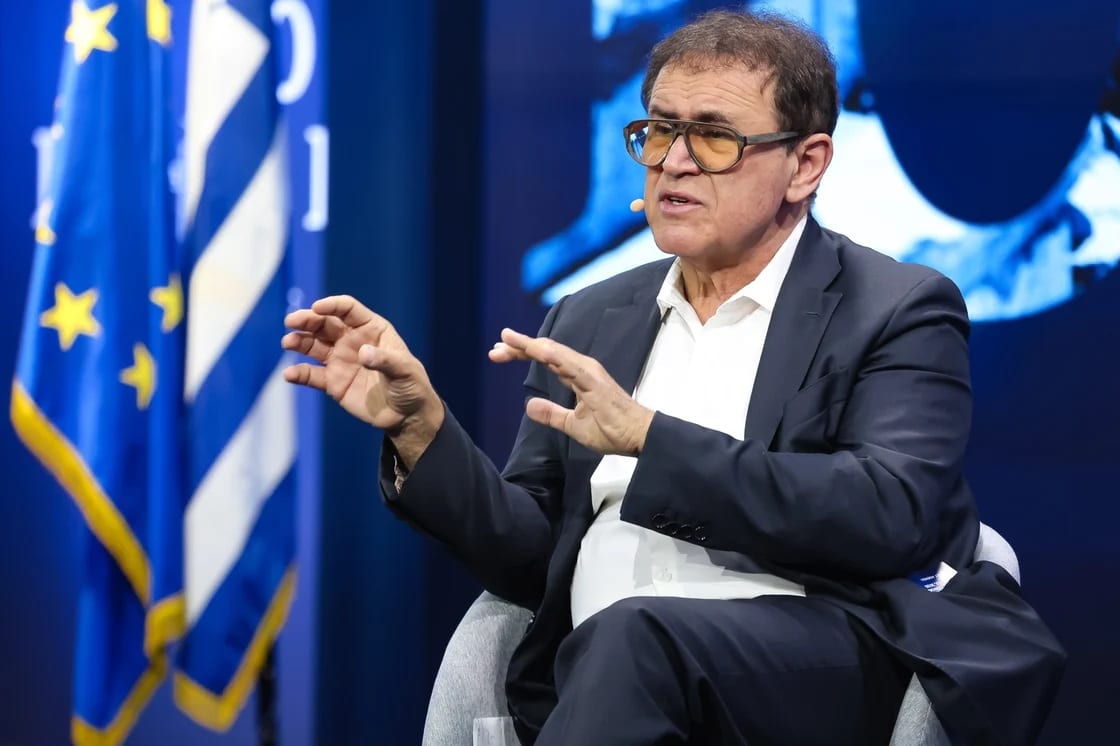

“I’ve gone from Dr. Doom to Dr. Boom,” said Nouriel Roubini with a wry smile, referencing the moniker he earned for his famously pessimistic economic forecasts ahead of the 2008 financial crisis.
Speaking with Simon Nixon, Publisher of Wealth of Nations, at the 10th Delphi Economic Forum in Greece (April 9–12), the CEO of Roubini Macro Associates struck a markedly more optimistic tone.
Roubini outlined a bullish outlook for both the U.S. and global economies, attributing his shift in perspective to what he called an imminent technological revolution centered in the United States. He argued that this surge in innovation will not only drive productivity to new heights but also neutralize the negative impact of tariffs and trade tensions.
“Artificial intelligence is set to transform a dozen major sectors, propelling economic growth,” he said. “By the end of this decade, U.S. growth could hit 4 percent. By the end of the next decade, we might see 6 percent.
“For the first time in history, we’re entering a phase of exponential innovation. Technology will offset protectionist policies. Even amid a trade war, the U.S. economy will continue to expand—and that growth will spill over to the rest of the world. Even Greece can benefit.”
He emphasized that large corporations are no longer waiting for political clarity. “Big companies aren’t concerned about tariffs. What matters to them is investment in technology and AI. If they don’t act now, their competitors will leave them behind,” Roubini noted. “With the momentum that innovation brings, it won’t even matter if Mickey Mouse is president—the economy will keep growing.”
When asked about former President Donald Trump’s decision to announce a 90-day suspension of tariffs on 75 countries, Roubini identified four key drivers behind the shift: market discipline, the Federal Reserve, Trump’s own economic advisors, and his tenuous majority in Congress.
“Bond yields were climbing, and the dollar was falling in a disorderly fashion,” Roubini explained. “That kind of volatility would not just spook markets—it could crash the economy. Trump couldn’t fight that kind of pressure. In the end, it was investors, bond vigilantes, and market forces that forced him to reconsider.”
He also praised Federal Reserve Chair Jerome Powell for holding firm during this standoff. “Powell didn’t blink in this game of chicken. He showed he has more power than Trump in this context,” said Roubini, who believes that the U.S. may reach trade agreements with several key partners—excluding China—within the 90-day window.
Regarding Europe, Roubini predicted that Trump’s negotiating strategy will likely involve demands for increased defense spending—specifically, through the purchase of U.S. weapons systems—as well as a greater commitment to importing American liquefied natural gas (LNG). In exchange, Roubini suggested, Trump may offer to cap tariffs at 10%.
“A 10 percent tariff on European goods isn’t ideal, but it won’t devastate Europe’s economy,” he said. “It’s manageable. In fact, this scenario might reduce the broader risk of a global recession.”
But the outlook for U.S.–China relations is significantly more fraught. According to Roubini, Trump views China not merely as an economic rival but as a strategic threat. “He believes China is out to undermine the United States—not just economically, but militarily. I fear that even if talks are attempted, no real agreement is likely. An escalation seems more probable.”
Roubini described the standoff between Trump and Chinese President Xi Jinping as another “game of chicken,” but with different dynamics. “Xi doesn’t face elections. He can inject massive fiscal stimulus, devalue the yuan, or enact reforms to boost domestic consumption,” he noted.
“In a way, Trump’s aggressive stance might be good for China and Europe. These are systems that tend to act only under crisis—this pressure may force them to implement necessary reforms.”
In conclusion, Roubini didn’t shy away from criticizing Trump’s trade policies. “Yes, what Trump is doing is crazy and unfair,” he said, “but China also needs to reform its economic model. It’s no longer just the U.S. demanding change—the rest of the world expects it too.”
